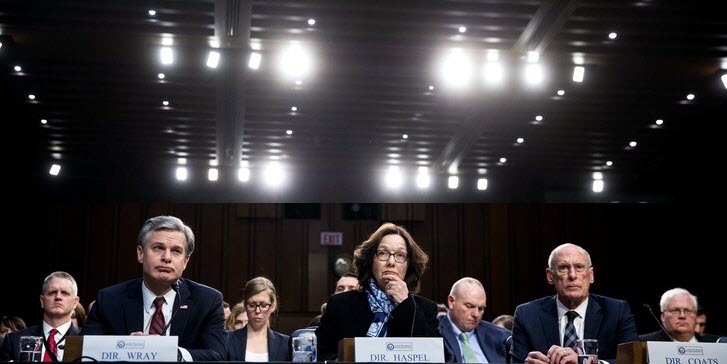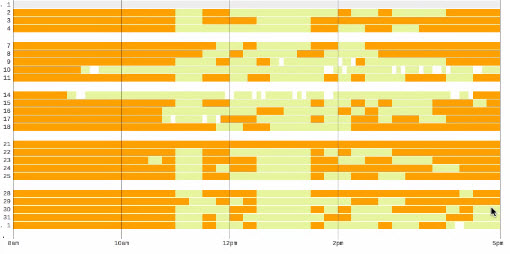Trump Defies Intelligence Chiefs and Shuns Briefings Say Leaked Schedules
In a dangerous world, he finds national security threatened only on the Mexican border Feb 9 2019Once again we were made aware of the chilling disconnect between President Trump and his intelligence chiefs when, after their annual briefing to the Senate Intelligence Committee of the threats we face around the world, he tweeted the 
Senate Intelligence Committee hearing: L. to R.: Christopher Wray, head of the F.B.I.; Gina Haspel, C.I.A. director; Dan Coats, Director of National Intelligence
next morning that the chiefs were “passive and naïve” and suggested they “should go back to school”.
The disconnect was simultaneously borne out by a Time magazine article citing officials who witnessed "multiple, in-person" instances of the president exhibiting "willful ignorance" at his daily intelligence briefings, and by a leak to online news site Axios of the most recent three months of the president's schedule showing that he sees no urgency in those briefings.
Time reported that intelligence officials are breaking their accustomed silence to warn the public that the president is endangering American security with what they say is an obstinate disregard of their assessments.
flex time
The leak by a White House source to Axios of Donald Trump's schedule shows that the president spent fully 60% of of those three months in the undefined category of 
A charted excerpt of the president's schedule. Orange represents
"executive time"
"executive time". The term was hit upon by former Chief of Staff Gen. John Kelly to cover the president's unaccounted-for time. Critics say that the released schedules prove that Trump spends most of his time tweeting, watching television, and calling friends. His supporters say that he simply prefers an unstructured schedule. Press Secretary Sarah Sanders e-mailed:
"President Trump has a different leadership style than his predecessors and the results speak for themselves. While he spends much of his average day in scheduled meetings, events, and calls, there is time to allow for a more creative environment that has helped make him the most productive President in modern history… It’s indisputable that our country has never been stronger than it is today under the leadership of President Trump."
Fox News fell in behind the president. Martha MacCallum of "The Story" said of executive time, "He's doing things. He's reading the papers". Howard Kurtz said, "Who cares how he runs his schedule as long as he gets things done". Greg Gutfeld of "The Five" urged Trump to "Do more of it. Have more executive time, I say". A guest on "Fox & Friends" gushed, "The guy is the hardest working person there is and what?, just because you don't have a scheduled event?"
Former Speaker Newt Gingrich likened Trump to Winston Churchill's unusual work habits in defense of the president's leisurely and unscripted hours. Previous chiefs of staff were generous in allowing that a president has the right to set his own circadian rhythm while qualifying that the presidents they worked for bore no resemblance to Mr. Trump's
time outBut by any measure, Mr. Trump cannot boast of an exhaustive schedule. He often complained of Barack Obama's approach to the job ("I love working, I'm not a vacation guy, like Obama… He goes out and plays golf all the time"), but by the end of 2018, Mr.Trump had visited his properties on 218 of his 710 days in office and played golf 166 times. For Obama, two years into his first term, it was 58 rounds.
early birdThe president certainly rises early — often before 6:00 am as the timestamps on his tweets bear witness — but doesn't arrive at the Oval Office until 11:00 am, when he typically receives the daily intelligence brief that has long been the start of a president's day. But the schedules label the hours from 8:00 to 11:00 am as "executive time" as do they also label chunks of time in the afternoons (see illustration above).
For past presidents, the meeting for the President's Daily Brief (PDB) was always the first order of business, starting usually at 8:00 am. Intelligence agency staff have been at work through the night culling reports from around the world and filtering them into the PDB — it's a full briefing book — ready when the president wakes up.
Kelly Magsamen, former national security council and Pentagon official under President Obama, says that he "would have read that book before he even entered the Oval Office" and would have sat with his national security team and adviser to discuss the day's findings.
Mack McLarty, who served as chief of staff for Bill Clinton, speaks of that president's voracious curiosity, saying he often tried to get Clinton to read less of the briefing papers. In the morning session, McLarty could see from where he was sitting that Clinton had already read the PDB before the session began, witness notes he had written in the margins.
George W. Bush was punctual to a fault, up around 5:00 am, arriving at the Oval Office at 8:15, and working 10 1/2 hour days, divided into tightly adhered-to 10-minute segments.
Jeh Johnson, Secretary of Homeland Security under Obama, said "The most important part of a president's day is the daily intelligence briefing" and without that briefing, "you are flying blind if you are responsible for any part of national security". Moreover, "you have the briefers go back over it with you to make sure you got it". He allowed that "they're not perfect" and occasionally an analyst is "a little over his skis, he's kind of reaching for an assumption" and needs to be challenged on how a conclusion was reached, but the briefings are "the tools for navigating national security and if you don't use them, that's a big, big problem".
Unmentioned by them is why the 8:00 am jump start matters — that the rest of the world has been awake for a good dozen hours. Thanks to geography, the United States is already well behind what may have happened elsewhere.
contrarianTrump has been hostile to the intelligent agencies' work from the outset. In a "Face the Nation" interview on CBS just after the Senate intelligence hearings, he disagreed with the assessment that Iran is in compliance with non nuclear weapon development:
"President Bush had intel people that said Saddam Hussein in Iraq had nuclear weapons — had all sorts of weapons of mass destruction. Guess what? Those intel people didn't know what the hell they were doing, and they got us tied up in a war that we should have never been in."
That's been a standard justification for Trump discrediting the work of the thousands at the intelligence agencies. No matter that it was 17 years and almost a generation ago. For him, nothing could have changed.
On taking office he bridled at the notion of daily briefs. He told Fox News' Chris Wallace:
"I don’t have to be told — you know, I’m like, a smart person — I don’t have to be told the same thing and the same words every single day for the next eight years”.
NBC News' Ken Dilanian says Trump "doesn't take many in-person briefings" and "he doesn't read his daily intel brief" either. He relies on his "gut", as he's said more than once, which somehow knows more than the intelligence gathered everywhere in the world every day that $81 billion a year buys. The calendar published by Axios shows only 17 intelligence briefings specifically described in the 85 day span. When he does accept a briefing, he often becomes angry when briefers present data that contradict his beliefs, says the Time report. He was asked on MSNBC's "Morning Joe" during the campaign, "Who are you consulting with consistently so that you are ready on day one?" He answered:
"I'm speaking with myself, number one, because I have a very good brain… I know what I’m doing and I listen to a lot of people…But my primary consultant is myself and I have a good instinct for this stuff".
Bringing that up to date, days ago he said, "So when my intelligence people tell me how wonderful Iran is" — by which he meant CIA Director Gina Haspel saying Iran is in compliance — "if you don't mind, I'm going to just go by my own counsel."
To try to keep the president engaged, officials and analysts who prepare the briefs, use visual aids such as charts, distill points to two or three sentences for a president who does not read, and "repeat his name and title as frequently as possible" says Time's article. One story told of the president wandering off in the middle of a briefing to watch the huge television screen he had installed in an adjacent room when he moved into the White House.
alternate realityThe president's version of the world has caused observers to conclude that he clings to his own view of reality, what White House communications director for a dozen days, Anthony Scaramucci, called Mr. Trump's "reality distortion field" which "curves facts toward himself". Former CIA head Michael Hayden said, "This is the first president that the intelligence community has had to deal with whose instinctive departure point is not the truth. He goes from his belief first". In that more comfortable outlook he believes he has established warm relationships with leaders of adversarial countries — Russia's Vladimir Putin, North Korea's Kim Jong-un and China's Xi Jinping among them. Intelligence officers have been warned to steer clear of reports that disagree with Trump's publicly stated views. That's what brought about the "willful ignorance" comment. He does not want to hear the contradictory information brought to him daily by the multiple U.S. intelligence agencies despite their having their ears to the ground around the world. What could make the capabilities of those agencies clearer, compared to Trump's gut, than their intercept of a 2017 conversation inside Saudi Arabia of Crown Prince bin Salman saying he would use "a bullet" on Jamal Khashoggi?
So he accepts Kim Jong-un's claim that North Korea has destroyed their major underground nuclear testing complex at Punggye-ri. In an attempt to make the president more aware of how questionable that claim is, the National Geospatial-Intelligence Agency built a model of the facility, replete with a scaled rendering of the Statue of Liberty to show relative size, and with a "roof" that replicates the terrain covering it, so as to register with the president the enormity of the site when the roof was lifted away. But nothing has dissuaded Trump from believing the North Korean dictator.
With a summit meeting with Mr. Kim scheduled for the end of February and a possible trade deal with China to head of the March escalation of tariffs, we should be worried that Mr. Trump's emphasis on being embraced by these autocrat rulers will cause him to sell out America.
Please subscribe if you haven't, or post a comment below about this article, or
click here to go to our front page.

